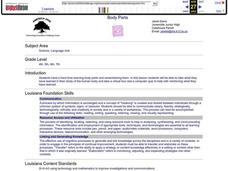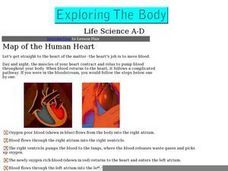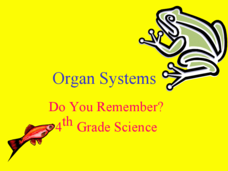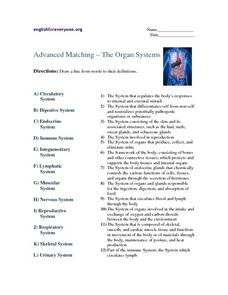Curated OER
Human Anatomy- How Do We Move?
Students examine the muscular system. In this muscular system instructional activity, students first draw a realistic representation of their leg or arm bones. Students do several activities to attach these bones to "joints" with...
Curated OER
Body Parts
Students discuss the importance of systems of the human body and ways each has its own function while relying on the others. Students work in groups to research their assigned system. They complete a report. Students take virtual tours...
Curated OER
Map of the Human Heart
Click on this link and find two animated graphics of the pumping human heart. The path of blood-flow is listed in steps. The connection to the "teacher lesson plan information" does not work, but there are other links to superb resources...
Curated OER
Immune System
Defense mechanisms, the lymphatic system, antibodies, and allergy are all topics addressed in this immunity activity. Although designed as a chapter review for a specific text, it can be used as a unit review for any class in which you...
Curated OER
Traveling Through the Digestive System
Second graders learn about how the food is broken down in our bodies and the job of each body part involved in our digestive system. The utilize the CD ROM game, "Body Works." This wonderful game takes pupils through the human body's...
Curated OER
Human Parts
Very young learners who are studying the human body will use this worksheet to identify certain body parts. A cartoon drawing of a boy is shown, and learners must draw lines matching up words such as arm, tummy, foot, and toes to the...
Curated OER
Body Parts
For this science worksheet, learners identify the placement of the main parts of the human body. Students begin by cutting out the head and torso pieces and pasting them and the smaller body parts in the proper location.
Curated OER
Exercise and the Human Heart
Interpret data and learn about the human heart in one activity! After learning about the way blood flows in the body, fifth graders answer two questions about a graph displaying pulse rate. They then take their own pulses to find the...
Curated OER
Organ Systems
Get your 4th graders ready for the big biology test with this PowerPoint. This presentation provides students with 12 questions to test what they know about the organ systems. Tip: Spice up test prep and turn this PowerPoint into a game....
Curated OER
Human Body Word Search
Although this very simple human body word search has little academic value, it may assist with spelling for some learners. There are only six terms: blood, bone, spine, lung, vein, and skull. This worksheet can easily be uploaded into a...
Curated OER
Advanced Matching - The Organ Systems
What's the difference between the digestive system and the endocrine system? Explore 12 body systems in this anatomy matching worksheet, for which learners find descriptions corresponding to anatomical terminology. Some of the...
Curated OER
A Pill with a View
Learners brainstorm a list of potential uses for micro-video technologies. After reading an article, they analyze the development of a new pill-sized camera. In groups, they create a children's book that shows them the various systems of...
Curated OER
Neurons and the Nervous System
The highlight of this series is activitiy #4. Anatomy pupils examine slides of three unknown cells. With the function of the nervous system in mind, they consider the structure of each and try to guess which one is part of that system....
Curated OER
Human Body Systems 1 Word Search Puzzle
In this biology word search worksheet, students search for 2 terms related to human body systems. They check off 2 words that are shown in a word bank at the bottom of the page.
Study Stack
Human Biology Crossword Puzzle
In this online interactive human biology crossword puzzle worksheet, students use the 9 clues to find the appropriate answers to complete the word puzzle.
Alabama Learning Exchange
Systems of the Human Body
Young scholars research systems of the human body. For this biology lesson, students read the book Yucky Story and identify the systems of the human body. Young scholars create a Powerpoint presentation to demonstrate their knowledge of...
Curated OER
Making and Using a Gel Person to Teach Human Anatomy
Students investigate organs, anatomical planes and transverse sections of the human body using gel people. In this human anatomy lesson plan, students use gel molds, gel and food items to make models of the human body. They create a...
Curated OER
Wired with Alexander Calder
Kids consider how the body functions and moves, how each structure has a specific movement and purpose. They apply that idea as they construct a sculptural piece that moves. For inspiration they look to the work of Alexander Calder,...
Baylor College
Pre-Assessment: The Brain
Break your class in to the general structure and function of the brain. Brainiacs discuss what they know about it and create personalized brain development timelines. They also take a true-false, pre-assessment quiz to get them thinking...
Science 4 Inquiry
Body in Balance
The human body maintains homeostasis through the interconnection of multiple systems. Young scientists match these connections and discuss how they relate to each other. They apply their knowledge to solve the mystery of a treasure hunter.
Curated OER
The Human Body
A 'People Scavenge' activity gets students out of their seat and in search for their peers, in order to discover differences among themselves. Prior to the hunt, students will complete a skit based on a portion of the Bible. The students...
Curated OER
Human Biology: Organ Systems
In this anatomy worksheet, students use their textbook, notes, or Internet to complete required information for 11 different human organ systems.
Curated OER
Bones Provide Great Support!
How do bones help people move around? A science investigation prompts kids to draw arrows to certain bones that protect their organs. After they finish, they trace their hands on a piece of paper and trace the way their bones go. Great...
Curated OER
Can You Make a Muscle?
Why are muscles important? Third graders study the different kinds and functions of muscles in the human body. After drawing arrows in an illustration to indicate where a muscle contraction would occur, they do their own experiment about...
Other popular searches
- Human Body Anatomy
- Human Body Anatomy Sketching
- Human Body Anatomy Diagrams
- Human Biology and Anatomy
- Human Body Anatomy Muscles
- Human Body Anatomy Game
- Human Brain Anatomy
- Human Body Anatomy Brain
- Human Body Anatomy Bones
- Human Heart Anatomy
- Human Body Anatomy Hearing
- Human Body Anatomy Veins























